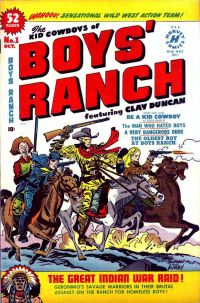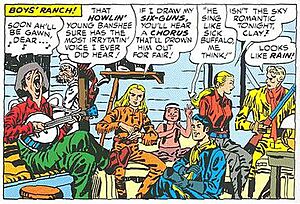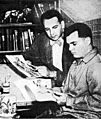Boys' Ranch facts for kids
Quick facts for kids Boys' Ranch |
|
|---|---|
 |
|
| Publication information | |
| Publisher | Harvey Comics |
| Schedule | Bimonthly |
| Format | Ongoing series |
| Genre | Western |
| Publication date | October 1950 – August 1951 |
| Number of issues | 6 |
| Main character(s) | Clay Duncan Dandy Wabash Angel Wee Willie Weehawken Happy Face Palomino Sue Geronimo |
| Creative team | |
| Artist(s) | Mort Meskin Marvin Stein |
| Creator(s) | Joe Simon, Jack Kirby |
| Collected editions | |
| Kid Cowboys of Boys' Ranch | ISBN 0-87135-859-X |
| The Best of Simon and Kirby | ISBN 1-84576-931-7 |
Boys' Ranch was a comic book series from the United States that came out in 1950. It was created by two famous comic book artists and writers, Joe Simon and Jack Kirby, for Harvey Comics. The series was a Western story, much like popular movies at the time that featured groups of kids.
The main characters were three teenage boys named Dandy, Wabash, and Angel. They ran a ranch that was given to them. An adult frontiersman named Clay Duncan helped supervise them. Other characters included Palomino Sue, Wee Willie Weehawken, and a fictional version of the real-life Geronimo.
The comic books were known for their amazing single and double-page drawings. Many people think Boys' Ranch is one of Simon and Kirby's best works. The series had six issues. Later, in 1991, all six issues were reprinted in a special hardcover book.
Meet the Characters
The comic book series features a group of unique characters who live and work together at the Boys' Ranch. Each character has their own interesting background and personality.
Clay Duncan: The Ranch Foreman
Clay Duncan is an experienced Native American scout. He works as the foreman, or manager, at the Boys' Ranch. He is a role model for the boys, much like famous frontiersmen such as Kit Carson or Davy Crockett.
When Clay was a young child, bandits killed his parents. He was saved by a group of Apache Indians and adopted by an Apache named Running Bear. Running Bear's own son was Geronimo. As an adult, Clay left the Apache tribe to become a scout. He sometimes takes on other jobs, like an army scout or a US Marshal. His horse is named Ghost.
Dandy: The Civil War Veteran
Dandy is a friendly and confident kid with a big smile. He fought in the American Civil War on the Union side. He usually wears a Union Army uniform. Dandy left his adoptive parents in Ohio to explore the American West. He is often shown being interested in girls.
Wabash: The Hill-Folk Musician
Wabash is an easy-going boy who comes from the "hill-folk." He is known for his banjo playing and singing, which often provides funny moments in the stories. His family history is told in a tall tale called "The Legend of Alby Fleezer."
Angel: The Skilled Gunfighter
Angel is a blond youth with long hair. He is inspired by the famous outlaw Billy the Kid. Angel is a very skilled gunfighter and has a quick temper. He is sometimes called 'the fire-eatin', lead-throwin' angel'. When he first met Clay Duncan, Angel said he didn't need anyone and could handle himself. His horse is named Paint.
Wee Willie Weehawken: The Ranch Cook
Wee Willie Weehawken is the first person to arrive at the Boys' Ranch. He is called the "oldest boy at Boys' Ranch" because he is older than the others. He is the cook at the ranch. It is revealed that he used to be a lawyer when he was younger.
Happy Boy: The Young Native American
Happy Boy is a young Native American boy who showed up at the ranch one day. He doesn't appear on the comic book covers, but he is in some of the special drawings inside. In later issues, he starts to communicate using sign language and plays a bigger part in the stories.
Palomino Sue: The Brave Survivor
Palomino Sue comes from Abilene, Texas. Her father was a wagon master. She arrived at Boys' Ranch after her father's wagon trip was attacked by Native Americans, and she was the only one who survived. Clay Duncan often tells her it's too dangerous for her to fight. She pretends to agree but then joins the action to help out. This happens several times in the series.
Geronimo: Clay's Boyhood Rival
Geronimo is shown as a strong Apache military leader. He was the son of Running Bear, who adopted Clay Duncan. This means Geronimo and Clay were childhood friends. However, Geronimo felt jealous of Clay's place in the tribe, and they became rivals.
Storylines and Themes
Many different Native American tribes appear in the comics. The stories often show how conflicts between white settlers and Native Americans were caused by dishonest white people. For example, in one story, white criminals tricked the Comanche and Blackfoot tribes into thinking their land would be taken. This was so the criminals could sell them rifles. In another story, white robbers blamed the Apaches for stealing mail wagons, but it was a trick.
The very first issue of Boys' Ranch begins with Dandy and Wabash meeting. They had fought on opposite sides in the Civil War but became friends and decided to go West together. Meanwhile, Clay Duncan meets Angel. The four of them team up to defend a ranch belonging to Jason Harper from an attack by Apache warriors. Geronimo is shown leading the Apache group. Before he dies, Jason Harper gives his ranch to the young boys to use as a safe place for homeless boys.
Later, Wee Willie Weehawken joins the ranch. Even though he is an adult, he argues that the will didn't say there was a maximum age to be a "boy." Happy Boy joins the ranch soon after. The ranch is located near a town called Four Massacres.
The "Mother Delilah" Story
One of the most famous stories from the series is "Mother Delilah," which appeared in issue #3. Jack Kirby himself said it was one of his favorite stories. Many comic book experts and fans also praise it as one of Simon and Kirby's best works.
Images for kids
-
Joe Simon and Jack Kirby in their studio working on Boys' Ranch in 1950.
 | Calvin Brent |
 | Walter T. Bailey |
 | Martha Cassell Thompson |
 | Alberta Jeannette Cassell |



